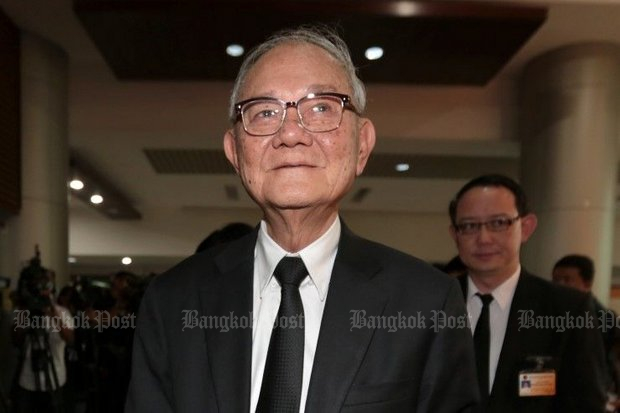
At least two issues stemming from the controversial primary vote system in the organic bill on political parties risk contravening the charter, says Constitution Drafting Committee chairman (CDC) Meechai Ruchupan.
He declared himself ready to sit on a joint committee ironing out the bill.
Small parties have also protested against the bill, saying it would deprive them of the chance to field MP candidates and suggested proposed party primary elections be put on hold.
Mr Meechai said criticism of primary voting from various quarters will be noted before it is decided whether a joint, tripartite panel of the National Legislative Assembly (NLA), the Election Commission (EC) and the CDC should be formed to thrash out contentious points in the organic bill.
The joint panel will be set up if the EC and the CDC decide the bill contains constitutional flaws after it has been tweaked by the NLA scrutiny committee and by the assembly.
The scrutiny panel introduced the primary system to the bill that would require members, representatives and branches of political parties to choose their MP candidates in general elections in a vote.
The CDC wrote generally in the charter that people must be allowed a role in deciding a party's MP candidates. The scrutiny committee later settled on the primary vote as the system to address the charter-stipulated people's participation.
Mr Meechai said the organic bill specifying a primary vote contained elements which may flout the constitution.

First, he said the system would create problems for parties, large and small, in selecting MP candidates in elections. He said not all parties have the money or the time to open enough branches and recruit members needed to conduct primaries in all constituencies.
That could lead to parties not fielding MP candidates in many constituencies, causing the election to be disrupted or even stopped, which goes against the spirit of the constitution.
"In practice, political parties, even the large ones, will be in for problems. Where will they find the time or the money to arrange the primaries?
"The law says we must have elections [in all constituencies]," Mr Meechai said. He said if an 11-member tripartite panel is set up, he is ready to be on it.
Another potential sore point in the bill that could run counter to the charter is whether the primaries are counted as part of the election process.
Mr Meechai disagreed with the EC's suggestion that primaries are an extension of a poll, saying if that were the case, primaries must be conducted by the EC, not parties.
If primaries are allowed to be handled by the parties when the EC should be doing the job, the confusion would present a danger in that the bill could violate the constitution, according to Mr Meechai.
CDC spokesman Norachit Sinhaseni, meanwhile, said the CDC has until July 5 to outline points it feels are potential constitutional quagmires in the organic bill.
Nineteen small parties petitioned the CDC on Monday, demanding a review of the proposed primary voting system.
Suratin Picharn, head of the Prachathippatai Mai Party (New Democracy Party) who leads the so-called "Reform of the New-era Politics" group, said its member parties agreed primaries would put small parties at a disadvantage due to limited resources and manpower to establish party branches and bring in members.
The group also asked that the tripartite panel rewrite the bill so that party executives listen to opinions of party members and branches in choosing MP candidates but are not required legally to take candidates nominated by the branches and members.